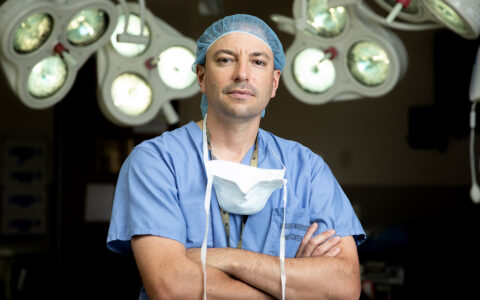Patients with cancer sickened by COVID-19 have a crude death rate of at least 13 percent, according to the largest multinational dataset released thus far. The initial data on 928 patients, published in The Lancet and later updated with extended follow-up, also revealed cancer-specific factors associated with increased mortality. The pioneering study was published on behalf of the COVID-19 and Cancer Consortium (CCC19).
The CCC19 electronic registry was built and is maintained at Vanderbilt University Medical Center, where further monitoring studies are underway. The registry is nearing 10,000 case reports, with over 8,500 being of high quality for analysis. An additional publication in Cancer Discovery examined the effects of COVID-19 treatment, and at least eight further scientific manuscripts are under review or preparation.
“CCC19 has been a massive effort to accumulate clinically-relevant data on a large number of patients with COVID-19 infection,” said Brian Rini, M.D., chief of clinical trials at Vanderbilt-Ingram Cancer Center and a senior author on The Lancet study.
Factors Increasing Risk
The data in the first CCC19 report from was gathered from Spain, Canada and the U.S. The early data showed no statistical association between 30-day mortality and cancer treatments, suggesting that surgery, adjuvant chemotherapy and maintenance chemotherapy could continue during the pandemic “with extreme caution,” despite uncertainties.
“People with cancer now face a great deal of uncertainty in the era of COVID-19, including whether the balance of risks and benefits in the treatment of cancer has shifted in a fundamental way,” said Jeremy Warner, M.D., an associate professor of medicine and bioinformatics at Vanderbilt and the study’s corresponding author.
“People with cancer now face a great deal of uncertainty in the era of COVID-19, including whether the balance of risks and benefits in the treatment of cancer has shifted in a fundamental way.”
While the death rate for patients with cancer as a whole was 13 percent, “certain subgroups, such as patients with active, measurable cancer and those with an impaired performance status, fared much, much worse,” Warner said.
Mortality risk steadily increased with age and the number of comorbidities (such as hypertension or diabetes), and particularly with two or more comorbidities. Mortality was 6 percent for patients under 65 years old, 11 percent for those 65-74 and 25 percent for those older than 75. Males also had a higher death rate than females (17 versus 9 percent).
A Massive Ongoing Effort
Building on the study’s momentum is a complementary effort, the NCI COVID-19 in Cancer Patients Study, for which Rini is one of two principal investigators. The natural history study will monitor 2,000 patients with active cancer – and a positive SARS-CoV-2 PCR test – for two years. It involves more than 800 sites, Rini said, in all 50 states.
Far beyond an EHR registry, the study includes biospecimen research into antibody and cytokine development, drug responses and genetic polymorphisms. It will also create a bank of clinical data, biospecimens and imaging for future use.
“It’s a massive initiative by the NCI,” Rini said. “A 2,000-patient clinical trial is a big clinical trial in any setting. Most large-scale trials are 500 to 1,000 patients. While this trial is not administering a specific therapeutic – there is no single experimental drug being given to people as part of a trial – it’s a big effort.”
The researchers emphasize additional efforts are underway to closely monitor cancer patients who acquire COVID-19. Together, the registries and studies could provide highly detailed data to guide future care.






